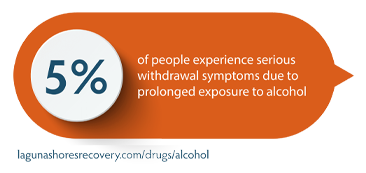Alcohol Rehab & Detox in Orange County, CA
Our Top Treatment Options
Understanding Alcohol Use Disorder
Risks Associated With AUD
AUD is a chronic disease that affects brain functioning. It can be genetically passed down or may be environmentally or psychologically based. 4 When you feel that you cannot function without drinking on a regular basis, it’s likely that you are suffering from an abuse issue.
Alcohol addiction is the third leading, preventable cause of death in the United States. 3 Its effects can negatively intrude on nearly every aspect of a person’s life, including:
- Physical and mental health
- Social, employment and family relationships
- Causing or becoming victim to unintentional injuries and accidents
More than 15 million adults ages 18 and up suffer from alcohol addiction in the United States. 1 The rate of alcoholism, medically referred to as alcohol use disorder (AUD), is on the rise in America, with about one in eight adults meeting the criteria for this diagnosis. 2 That figure equals to approximately 12% of the U.S. population suffering from a form of AUD.

Symptoms of AUD
- An uncontrollable urge to drink
- Little to no control over how much alcohol is consumed
- When not drinking, thoughts become more negative in nature
- Drinking in risky situations, such as driving after drinking
- Drinking gets in the way of your family and/or work obligations
- Although it causes worsening problems, drinking continues
- Avoiding activities once enjoyed in order to drink
- Legal problems as a result of drinking
- Drinking to relax or to sleep
- Drinking first thing in the morning
- Greater amounts are needed in order to feel its effects
- Symptoms of withdrawal begins when you stop drinking for too long
There are more symptoms and signs associated with AUD. The more of the above issues that relate to you, the greater your severity of addiction is likely to be.
Detox & Withdrawal
With AUD, the body has adjusted to having alcohol in the system around the clock. When those levels drop dramatically, your brain is still working hard to keep the central nervous system functioning as though nothing has changed yet. This causes an agitated state to occur within the body, resulting in withdrawal symptoms.
When detoxing the body, the symptoms of withdrawal can vary from mild to serious, depending upon the severity and length of the disease.
Early Withdrawal Signs
- Feelings of anxiety
- Shaking hands
- Headaches
- Nausea and/or vomiting
- Experience trouble sleeping
- Sweating

Serious Withdrawal Symptoms
- Delirium tremens (the DTs), causing acute hallucinations and delusions
- Pounding heartbeat
- Confusion
- High blood pressure
- Fever
- Considerable amount of sweating
- Hallucinations
- Seizures
Long Term Effects
Cancer
Some of the physical conditions that can occur as a result of AUD are liver damage, heart disease and the risk of acquiring various forms of cancer.
You are at greater risk for developing a type of cancer if you are a heavy drinker.
The Most Commons Form of Cancer Associated with Alcoholism
Liver and Kidney Cancer: Alcohol abuse, over time damages the liver. Creating a lot of scar tissue that causes inflammation and risk for cancer. The kidneys have a tough job ridding the body of alcohol because this liquid also works as a diuretic. This also ups the risk of acquiring cancer in this organ.
Throat and Larynx cancer: Some people who abuse alcohol are also heavy smokers. Chronic alcohol intake decrease the ability of cells in the throat and larynx to fix any damage done by smoking, leading to increased risk for these type of cancer
Cancer of the Esophagus: Again, those who are heavay smokers and drinkers are at greater risk for esophageal cancer than those who abuse just one of these substances.
Breast Cancer: The risk for breast cancer in women is heightened with alcohol use disorder, even if use is mild to moderate in nature.
Colon Cancer: Men and women who suffer from alcoholism are at greater risk for developing colon or rectal cancer
Other Health Effects
The development of an AUD causes severe damage to the liver. Not only can liver scarring and inflammation lead to cancer, but it can also cause hepatitis or fatty liver disease.
Chronic drinking affects the lining of the stomach. Over the long term, this inflammation increases the risk for developing ulcers, ongoing heartburn and gastritis.
The inability to digest nutrients such as vitamin B12 or thiamine, resulting from heavy drinking can lead to malnutrition, brain damage and blood or immune system issues. AUD also has an especially negative effect on two digestive organs: the pancreas and the liver. Long-term use can cause pancreatitis, diabetes, cirrhosis and other liver problems discussed above.
The lack of vitamin B12 and thiamine retention in the body also affects the brain, leading to symptoms that can mimic dementia. Memory loss, blackouts and difficulty forming new memories can be long-term effects of alcoholism.
Reproductive fertility is also at risk, including the possibility of producing a child that is born with fetal alcohol syndrome.
The loss of nutrients incurred by chronic drinking affects bones and muscles, leading to the possibility of developing osteoporosis and osteoarthritis. Your immune system is also weakened, increasing your exposure to catching contagious diseases.
There are also mental health changes that occur with long-term AUD. Chronic and heavy drinking may trigger some mental illnesses due to the brain chemistry changes that occur. Depression and bipolar disorder are just two psychiatric conditions than can coincide with drinking.
Myths and Truths About Drinking

Beer vs. Hard Liquor
One misconception is that beer cannot get you as drunk as hard liquor. However, beer is just as intoxicating as liquor. It doesn’t matter what you drink, but rather how much is consumed. If you suffer from an alcohol use disorder, overindulging is the danger, even if the subtance has a lower alcohol content.

Developing a High Tolerance For Alcohol Makes You Lucky
Over time, chronic drinking leads to the development of tolerance. This means a greater amounts of alcohol is needed to feel the same effects. However, this indicates your body has been negatively affected by alcohol and is damaging your organs, putting you at risk for long-term healh effects

Coffee or a Cold Shower Will Get You Sober Quickly
This is not true. Only time will get you sober, because your body must process the alcohol it’s taken in. It takes 60 minutes to process each standard sized drink of beer, wine or liquor you drink

Eating a Big Meal Will Prevent Feeling Drunk
The effects of drinking alcohol may be delayed by eating a lot of food, but if you drink excessively, you will still get quite drunk. The rate of absorption of the alcohol will be slowed down, but food doesn’t interfere with the effects of alcohol.

Having a Nightcap Will Help With Sleep
The reverse is actually true. Alcohol is disruptive to sleep. It decreases the amount of REM time you get, which is necessary for a restful evening’s sleep.
Getting Sober
Entering an alcohol rehab and going through withdrawal and detox can be hard work, but the benefits are enormous. Mental and physical health improves, as well as relationships with others. There are a few challenges, however, both during and after gaining sobriety.
Detox is almost always involved in alcohol rehab treatments, as it is the first step towards becoming sober. Some people experience much pain during detox while others suffer only the milder symptoms of withdrawal. It takes a week or two or more to flush the system of toxins, depending upon the severity of the disease.
The detox process causes symptoms that may worsen, especially after the first 24 hours, when you may feel disoriented and have hand tremors in addition to the other symptoms mentioned. These may continue into the next day, with hallucinations and panic attacks.
After the first week of detox, these effects will begin to decrease. They can also be treated with medication and medical supervision, which is an important aspect of any detox program.
Entering an alcohol rehab and going through withdrawal and detox can be hard work, but the benefits are enormous. Mental and physical health improves, as well as relationships with others. There are a few challenges, however, both during and after gaining sobriety.
Detox is almost always involved in alcohol rehab treatments, as it is the first step towards becoming sober. Some people experience much pain during detox while others suffer only the milder symptoms of withdrawal. It takes a week or two or more to flush the system of toxins, depending upon the severity of the disease.
The detox process causes symptoms that may worsen, especially after the first 24 hours, when you may feel disoriented and have hand tremors in addition to the other symptoms mentioned. These may continue into the next day, with hallucinations and panic attacks.
After the first week of detox, these effects will begin to decrease. They can also be treated with medication and medical supervision, which is an important aspect of any detox program.
Some medications used to combat withdrawal symptoms for detox include:
- Benzodiazepines calm the central nervous system and help reduce insomnia, anxiety, and muscle spasms. These types of drugs are most often used in inpatient rehab settings.
- Naltrexone, which reduces the cravings
- Acamprosate, to help with normal brain function and reduce cravings
- Disulfiram, which produces undesirable side effects if you attempt to drink. These effects deter you from drinking and are more likely to be used during post-recovery to prevent relapse.
Becoming sober is a huge achievement, but there are still struggles to deal with afterward, especially during the first year. You may continue to experience some withdrawal symptoms, bouts of depression, have strong emotions, anxiety, sleep issues and have problems relating to friends and/or family members.
But you will look and feel much better over time, have greater control over your emotions when alcohol is no longer affecting your neurons and your mental health should steadily improve. Continuing on the path to physical sobriety will help you regain the psychological and emotional sobriety.




 Matthew Beck B.A, M.A, LMFT
Matthew Beck B.A, M.A, LMFT 


